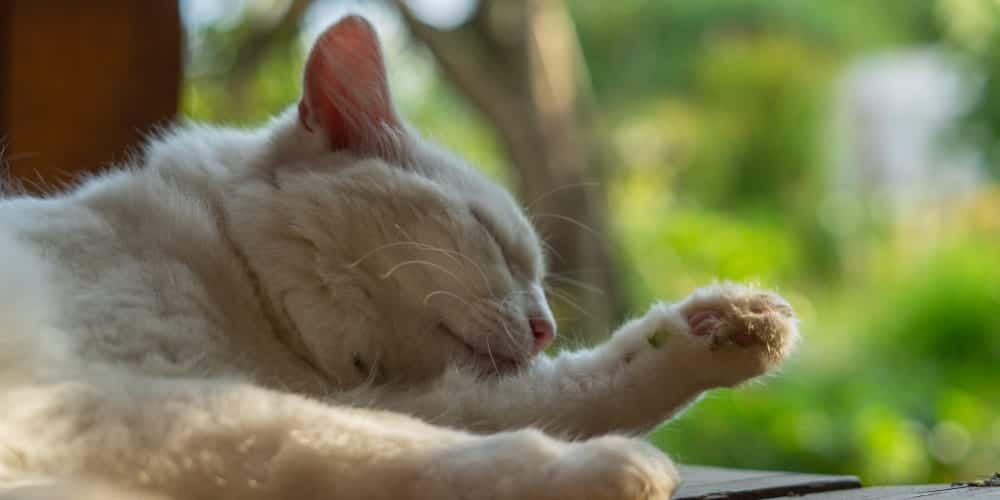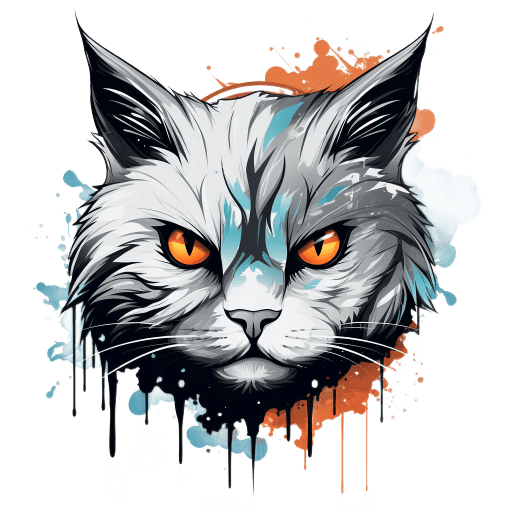Why Do Cats Eat Their Own Fur?

Have you ever wondered why your cat eats its fur? Cats eat their own hair for a variety of reasons. It’s important to understand the reasons behind it so that you can help them out and keep them healthy.
Some common reasons cats eat their fur include stress, boredom, anxiety, or an upset stomach. If your cat is eating too much of its hair, it may be due to a medical condition like allergies or parasites.
Read on to learn more about why cats eat their fur and how we can help them! You will also find some helpful tips at the end of this article for what you should do if your cat is eating too much of its hair.
The good news is that most of the time, this behavior can be easily curbed by addressing these causes! Here are seven common reasons for feline trichophagia (hair-eating).
Cat Attitudes is reader-supported. When you buy through links on our site, we may earn an affiliate commission.
7 Reasons Why Cats Eat Their Own Fur
Cats groom themselves, so it only stands to reason that it is possible that they would eat some of their fur just because it is stuck on their tongue. But there could be other reasons your cat is pulling her hair out and eating it.
Normal Grooming
This really goes along with what was said above. Cats are fastidious groomers and when they groom, they will have fur sticking to their tongue. The easiest way to get hair off their tongue is just to eat it. Having owned many cats, it was common to notice them swallowing the fur as a way of getting off their tongue. Along with swallowing the fur, there was also excess fur coming off their tongue onto the floor where the cats left it. This type of fur-eating is unintentional or accidental.
Dry Skin
One of the most common reasons why cats eat their own fur is because they have dry skin. If your cat has dry skin, then licking its fur will cause even more dryness and scratching will then result. Scratching and licking will be a never-ending cycle that can lead to hair-eating or trichophagia.
This type of hair-eating behavior is hard to stop once it starts without addressing the underlying issue – dry skin – although some cats respond to antihistamines or short rotation periods on a waterless diet. If your cat only eats its own fur occasionally, then this might be all it needs.
Flea Bites
Flea bites or an allergic reaction to flea saliva can also cause your cat to eat his own fur. Your cat will be extremely itchy and the only way for them to relieve this itchiness is by licking and scratching themselves (and sometimes consuming hair). If you take your cat to the vet and he identifies flea bites, then you should take care of them with a cat flea treatment.
Pica
Cats eat their fur when they have pica. Pica is the medical term for an eating disorder that usually involves craving an inedible object. This means your cat might want to eat something they know isn’t good for them, like hair, plastic, or dirt–anything but food. Cats crave things like hair because it’s in their system and they may not be getting enough in their diet.
Your cat might have pica if you notice them eating a lot of their own hair, or you see a big clump of fur hanging from its mouth. If this is the case, visit your vet to help diagnose and treat it.
Infections
Another common reason for hair-eating behavior in cats is due to parasitic infections. Ringworm, protozoal infections, and tapeworms can cause cats to eat their own fur because of the intense itching. If your cat starts eating its hair excessively and there is no sign of fleas or allergies, then you should take it to the vet to figure out if they have one of these parasitic infections.
Boredom
Cats can exhibit a number of behaviors due to being bored and one these can be eating their fur. If your cat is always alone and doesn’t have anyone to play with, they might start eating their fur to keep themselves entertained.
If your cat does this, you will need to give them more attention and play time so they don’t eat their own hair. There are also several toys that can keep your best friend entertained when you are not able to give them attention.
Stress
One of the most common reasons for a cat to eat its fur is stress. Your cat might be under a lot of stress from changes in its environment or because it doesn’t feel secure. If you have moved to a new house recently, brought a new pet into your home or your cat is feeling territorial, then they will start to lick and chew their own hair as a coping mechanism.
If this is the case, then you need to spend more time with your cat and give it attention that will help ease these problems. You can also try to introduce a new pet into the house slowly so they don’t feel threatened and make sure there is enough space for all of your pets in case your cat becomes territorial.
Can Eating Fur be Dangerous for Cats
If your cat eats fur that is sticking to his tongue when he is grooming himself is not much of a concern. All cats eat small amounts of hair as part of their grooming routine. The risk of choking on small amounts of hair is quite low, but not unheard of.
If your cat goes around looking for hair to eat, it could indicate that he is bored or has pica. If your cat is prone to hairballs, he could be a candidate for cat hairball blockage.
Tips for Prevent Cats from Eating Their Own Fur
There are ways to prevent your cat from eating its own fur. Keep in mind that a certain amount of fur eating done by your cat is unavoidable. There really is no other way for him to remove fur that is sticking to his tongue. Here are a few suggestions that help your cat spend less time eating his own fur.
Comb Their Fur – Combing your cat’s fur regularly will give him attention, remove loose and just generally help him feel better.
Try Different Food – If your cat has dry skin, try changing to a food created especially for cats with dry skin.
Avoid Boredom – Keep your cat stimulated and engaged with a variety of toys. Try these laser pointer toys that can be set on a timer. Your cat can have fun for 15 minutes or more without you.
Spend Quality Time with Your Cat – I never met a cat that did not like to be petted. Spend time with your cat giving the attention his personality demands.
Relieve Stress – Try identify what could be stressing your cat and possibly leading to him eating his fur. If it is possible to eliminate the stressor, do it. Feliway makes a line of products that can help calm your cat down.
See Your Vet – Depending on the severity of the problem of fur eating, you may want to talk to your vet about the issue.
Should You Be Concerned About Hairballs?
Cats don’t have sweat glands and so their only way of cooling off is by panting or licking their fur. Cats lick their fur to groom. When they do this, they mix saliva with the hair and either swallow it or cough it up as a hairball. Hairballs can cause blockages in the cat’s intestines that can be fatal if they aren’t treated quickly enough.
Hairballs seem to be most common in long-haired cats, but even short-haired cats can develop them. Factors that contribute to hairballs are dry food diets, which deprive the body of moisture; stress; allergies; parasites; too much grooming or not enough grooming.
The best way to keep this from happening is to brush your cat daily or at least a few times a week. You could also think about changing the type of food you feed your cat if they are starting to have problems with hairballs. Many veterinary clinics carry therapeutic diets for cats that help stop the problem.
When you notice any changes in your cat’s movements, eating habits, or facial expressions, you should bring them to your veterinarian for an examination. If your cat’s eating habits change or they start to eat their own fur, take them to the vet immediately.
Mary’s Story
Although Boy and Pixie coughed up the occasional hairball, they never really had anything consistent or serious when it came to hairball issues.
Mary, on the other hand, had a lot of hairballs. She was a Maine Coon and had lots and lots of very fine hair. It was easy to see in her case, the difference was she had lots of long fine hair. She never ate her fur. She just had a lot more of it stuck to her tongue when she groomed herself, and of course, she did eat that.
We did feed Mary a brand of food that was supposed to help with hairballs. She never had problems with hairball blockages, but we cleaned several hairballs a week off the floor.
Final Thoughts
Cats eating their fur can be a concern, but in most cases, it is just to get it off their tongue. Observe your cat and if that is all you see, your cat is just doing what comes naturally.
If you notice your cat going out of his way to eat anything other than food, fur included, this would be a good time to schedule an appointment with the vet. The solution could be very simple, but it is important to make sure that your cat does not need to be treated medically.
